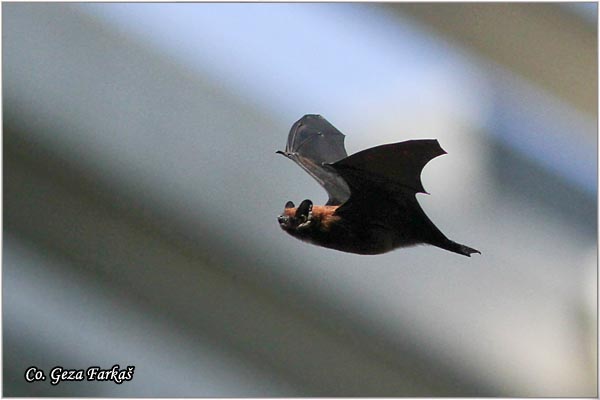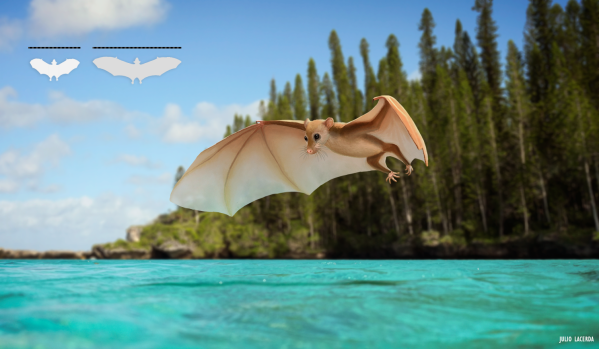 Azores Noctule by Geza Farkaš. It is one of the few fully diurnal bat species.
Azores Noctule by Geza Farkaš. It is one of the few fully diurnal bat species.
Historically, the nocturnality of bats has been used to make a point about how they are functionally inferior to birds, that they need to avoid competition or that their membranous wings somehow are inferior to feathered bird wings. In recent years, however, bats have been understood to actually be better flyers than birds in many respects, their supposedly less effecient fleshy wings actually allowing them to be more agile and to remain aloft wasting less energy. More recent functional comparisons with pterosaurs have shown that their shared quadrupedal launching is far more efficient and energy-saving than the bipedal launching of birds, and ultimately bats have never sacrificed their ability to fly in spite of their multiple attempts at terrestrial niches, as opposed to birds which become flightless as soon as possible.
Indeed, outright comparisons between insectivorous birds and bats prove that bats are more efficient at the aerial insectivore niche, and that there is relatively little ecological competition between diurnal bats and insectivorous birds anyways.
So, if bats are capable of co-existing with birds in the same ecological niche, why are most of them nocturnal?
Rather than competition, predation seems to be the primary issue here. For some reason, bats appear to be vulnerable to the attacks of birds of prey, and for this reason avoid them altogether by assuming nocturnal habits.
This is easily evidenced by the fact that some of the most diurnal bats occur in areas where birds of prey are rarer, such as the insular Azores Noctule (Nyctalus azoreum) and Samoan Flying Fox (Pteropus samoensis), where there are relatively few and recent-arriving raptors; in mainland regions, small diurnal bats occur in areas such as shielded valleys, where birds of prey are less likely to spot them. Studies indicate that larger bats are more likely to survive bird of prey attacks, which also explains why flying foxes have fairly diurnal habits compared to other bat species.
This does bring up the question as to why bats are still more affected by raptor predation than diurnal birds, given that they’re more agile than them in flight. This concern extends to gliding mammals as well, which are also overwhelmingly nocturnal; for instance, flying squirrels have developed nocturnal habits, as opposed to their diurnal non-gliding relatives. For some reason, mammals with aerial capacities just seem at disadvantage in daylight hours.
Or perhaps it was simply harder for birds to adopt nocturnal habits. Who knows.
We know for certain at least that pterosaurs were mostly diurnal aside from a few groups like anurognathids, which certainly suggests that they were like birds in this regard. Volaticotherium has been suggested to be nocturnal, but only on the basis of similarities with modern aerial mammals; given that relatively few pterosaurs were efficient aerial hawkers like modern raptors, its unclear if a Mesozoic flying mammal would have needed to resort to nocturnality in the same way.


A very intriguing post.
It seems quite paradoxical that bats are more agile and at the same time more vulnerable to raptor predation than birds. One possible reason for that might be that flocks of birds have better predator evasion techniques than groups of bats, making it harder to pick a single target? I have no idea what techniques bat colonies use to avoid and confuse predators, this is just speculation.
Maybe since many bats have so well adapted to nocturnal life and not having to deal with many diurnal birds of prey, they are more vulnerable when they do venture in the daylight. They most certainly have to deal with owls during the night, do we have any data on interactions between owls and bats or gliding mammals?
This post suggests that bats are more voracious insectivores than birds, might the reason for their nocturnal life just be that the prey of most bats prefers to forage during the cool hours of the night?
http://www.indefenseofplants.com/blog/2015/11/18/insect-eating-bats-eat-more-insects-than-birds-in-tropical-forests
Interesting.